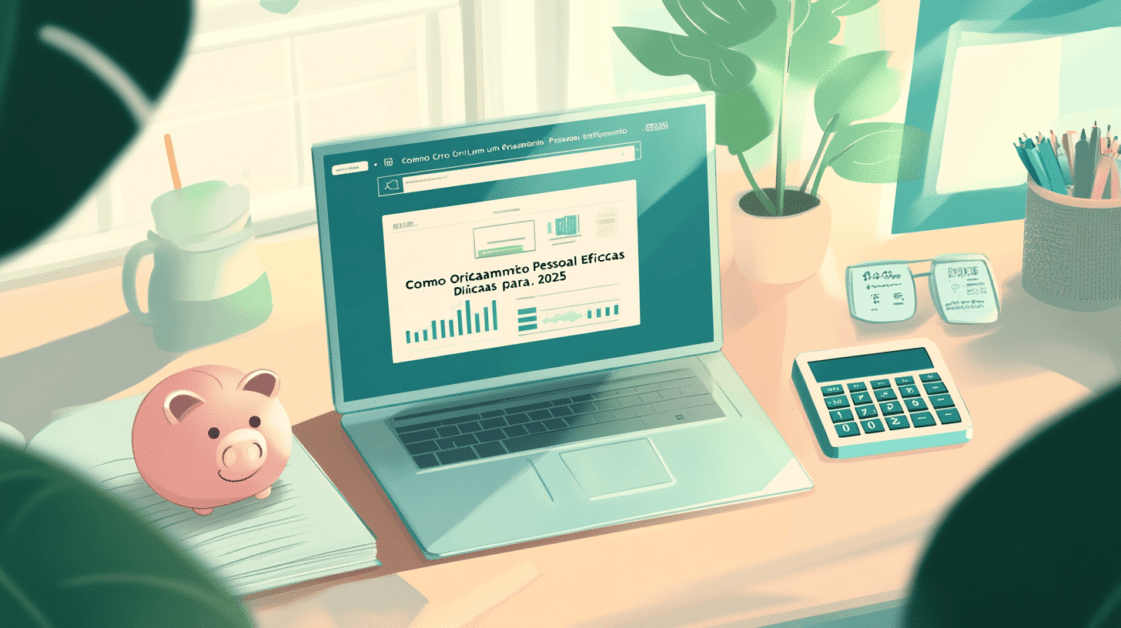Gerenciar suas finanças pessoais pode ser um desafio, especialmente quando os gastos parecem se multiplicar.
Um orçamento eficiente é uma ferramenta poderosa que pode ajudá-lo a ter controle sobre sua vida financeira, permitindo que você economize, invista e planeje para o futuro. Neste artigo, vamos explorar como você pode criar um orçamento pessoal eficaz em 2025, com dicas práticas e estratégias que funcionam.
O que é um orçamento pessoal?
Um orçamento pessoal é um plano que ajuda a controlar suas receitas e despesas em um determinado período. Ele permite que você visualize onde seu dinheiro está sendo gasto e onde você pode cortar custos para economizar mais. Sem um orçamento, é fácil perder o controle das finanças, resultando em dívidas indesejadas e estresse financeiro.
Por que é importante ter um orçamento?
Existem diversas razões pelas quais ter um orçamento é essencial. Primeiramente, ele proporciona uma visão clara de suas finanças, ajudando você a identificar gastos desnecessários e ajustar seu estilo de vida. Além disso, ajuda a garantir que você está economizando para metas futuras, seja para uma viagem, compra de imóveis ou aposentadoria. Em resumo, um orçamento bem estruturado é a base para a saúde financeira.
Como criar um orçamento pessoal passo a passo
Vamos detalhar um processo em oito etapas para ajudá-lo a construir um orçamento que funcione para você:
1. Defina suas metas financeiras
Antes de tudo, você precisa entender o que deseja alcançar financeiramente. Suas metas podem incluir: – Economizar para a aposentadoria – Pagar dívidas (cartões, empréstimos, etc.) – Fazer uma viagem em família – Poupar para a educação dos filhos Esta clareza o ajudará a direcionar seus esforços no orçamento.
2. Analise sua renda mensal
Liste todas as suas fontes de renda. Isso não se limita apenas ao seu salário. Considere: – Renda de investimentos – Freelances e trabalhos extras – Aluguéis ou rendimentos de propriedades Calcule a soma total para ter uma ideia clara do quanto você tem disponível mensalmente.
3. Faça um levantamento das despesas
A próxima etapa é listar todas as suas despesas. Divida suas despesas em duas categorias principais: – Despesas fixas: aluguel, contas de serviços públicos, prestações, seguros e mensalidades. – Despesas variáveis: alimentação, compras, lazer, transporte, etc. Anote os valores médios mensais para cada um deles. Isso ajudará a identificar onde você pode reduzir gastos.
4. Mantenha registro das despesas
Durante um mês, faça um acompanhamento de todos os seus gastos. Existem aplicativos financeiramente amigáveis que facilitam esse controle. Anote tudo, desde a compra de um cafezinho até as despesas maiores. Esse habitode manter registros ajudará você a ver onde seus gastos estão, permitindo que faça ajustes em tempo real.
5. Crie seu orçamento
Com toda a informação em mãos, comece a montar seu orçamento. Uma abordagem é o método 50/30/20: – 50% para necessidades (moradia, alimentação, transporte, saúde) – 30% para desejos (lazer, entretenimento, hobbies) – 20% para poupança e pagamento de dívidas Essa estrutura lhe permitirá equilibrar suas despesas e ainda garantir que você está economizando para o futuro.
6. Revise e ajuste regularmente
Um orçamento não é uma fórmula estática. À medida que sua vida muda, seu orçamento também deve mudar. É essencial revisar seu orçamento mensalmente e ajustar conforme necessário. Você pode encontrar áreas onde está gastando mais ou menos do que o previsto, e isso pode exigir uma reestruturação do seu plano original.
7. Use ferramentas de orçamento
Existem várias ferramentas e aplicativos que podem ajudá-lo a criar e manter seu orçamento. Alguns dos mais populares incluem: – Mint: ajuda a categorizar despesas e dá uma visão geral das finanças. – YNAB (You Need A Budget): foca em fazer cada dólar trabalhar para você e educa sobre como gerenciar bem os gastos. – PocketGuard: excelente para rastrear onde seu dinheiro está indo e para evitar gastos excessivos. Essas ferramentas podem simplificar o processo e manter você no caminho certo.
8. Celebre suas conquistas
Não esqueça de comemorar suas pequenas vitórias! Cada vez que você conseguir alcançar uma meta financeira, por menor que seja, é uma conquista que merece reconhecimento. Isso vai manter você motivado e fará a jornada financeira ser mais agradável.
Dicas Finais para o Sucesso do Orçamento
– Seja realista: Ao criar seu orçamento, evite subestimar suas despesas ou superestimar sua renda. Seja honesto consigo mesmo sobre seus hábitos financeiros. – Crie um fundo de emergência: Isso é crucial para lidar com despesas inesperadas sem comprometer seu orçamento. Tente ter pelo menos de 3 a 6 meses de despesas guardados. – Não tenha medo de cortar gastos: Às vezes, será necessário abrir mão de algumas luxuosidades. Pergunte-se: isso realmente vale a pena? – Eduque-se constantemente: Compreenda mais sobre finanças pessoais, pois isso vai ajudá-lo a tomar decisões mais informadas. Livros, podcasts e cursos online são ótimos recursos para aprofundar seus conhecimentos.
Considerações Finais
Criar um orçamento pessoal eficiente é um passo essencial para qualquer um que deseja ter um controle maior sobre suas finanças. Com um plano claro em mãos, você pode economizar para suas metas futuras, reduzir dívidas e alcançar uma maior segurança financeira. À medida que se propõe a ajustar e rever seu orçamento regularmente, você estará fazendo de 2025 um ano de conquistas e estabilidade financeira.
Convidamos você a compartilhar sua experiência ao criar um orçamento, bem como outras dicas que funcionem para você. Juntos, podemos aprender e crescer nesse processo de educação financeira!

